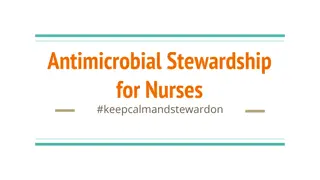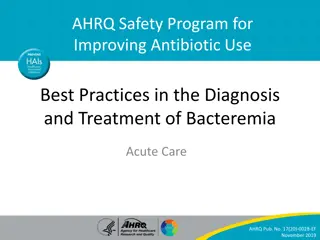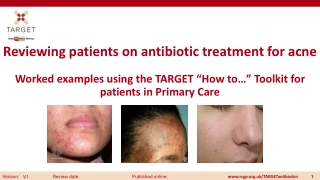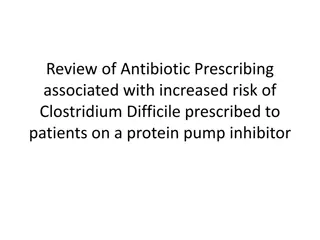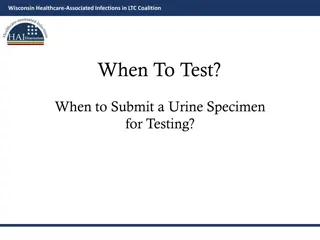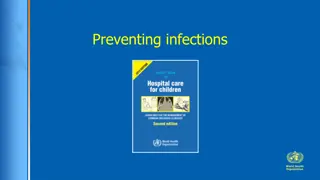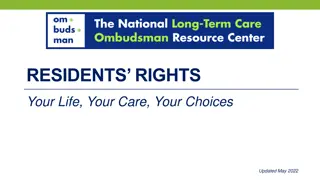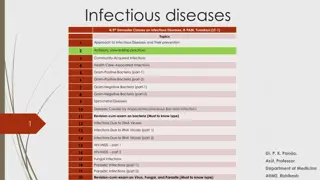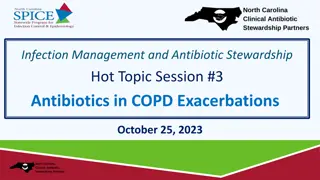Antibiotic Stewardship in Nursing Homes
This information discusses the importance of antibiotic stewardship programs in long-term care facilities, specifically nursing homes. It outlines the core elements of such programs, strategies for appropriate prescribing patterns, and how these programs support continuity of care. The content emphasizes the requirements of participation related to infection prevention and control, including the establishment of an antibiotic stewardship program. Guidance on developing protocols and monitoring antibiotic use, as well as the role of pharmacists in antibiotic assessment and communication, is also provided.
Uploaded on Sep 21, 2024 | 0 Views
Download Presentation

Please find below an Image/Link to download the presentation.
The content on the website is provided AS IS for your information and personal use only. It may not be sold, licensed, or shared on other websites without obtaining consent from the author. Download presentation by click this link. If you encounter any issues during the download, it is possible that the publisher has removed the file from their server.
E N D
Presentation Transcript
Antibiotic Stewardship in the Nursing Home Donna S. Thorson, MS, CPHQ, CPPS | Senior Project Manager, HealthInsight
Objectives Describe the core elements of an antibiotic stewardship program in long-term care Identify two strategies for supporting appropriate prescribing patterns for antibiotic therapy Explain how the antibiotic stewardship program in long-term care supports continuity of care
Nursing Home Requirements of Participation Phase 2 483.80(a) Infection prevention and control program. The facility must establish an infection prevention and control program (IPCP) that must include, at a minimum, the following elements: 483.80(a)(3) An antibiotic stewardship program that includes antibiotic use protocols and a system to monitor antibiotic use. Federal Register / Vol. 81, No. 192, p 68868
F881 INTENT The intent of this regulation is to ensure that the facility: Develops and implements protocols to optimize the treatment of infections by ensuring that residents who require an antibiotic are prescribed the appropriate antibiotic Reduces the risk of adverse events, including the development of antibiotic-resistant organisms, from unnecessary or inappropriate antibiotic use Develops, promotes and implements a facility-wide system to monitor the use of antibiotics Advanced Copy Appendix PP with Final IGs, SOM
Guidance on F881 The facility must develop an antibiotic stewardship program that includes the development of protocols and a system to monitor antibiotic use. This development should include leadership support and accountability via the participation of the medical director, consulting pharmacist, nursing and administrative leadership, and individual with designated responsibility for the infection control program, if different. Advanced Copy Appendix PP with Final IGs, SOM
F881 ASP in Relation to Pharmacy Services The assessment, monitoring and communication of antibiotic use shall occur by a licensed pharmacist in accordance with 483.45(c), F756, Drug Regimen Review. A pharmacist must perform a medication regimen review (MRR) at least monthly, including review of the medical record and identify any irregularities, including unnecessary drugs. Advanced Copy Appendix PP with Final IGs, SOM
CDC Core Elements Leadership support Accountability Drug expertise Actions to improve use Tracking: Monitoring antibiotic prescribing, use and resistance Reporting information to staff on improving antibiotic use and resistance Education
Agency for Healthcare Research and Quality (AHRQ) Nursing Home Antimicrobial Stewardship Guide Toolkits Implement, Monitor and Sustain an Antibiotic Stewardship Program (ASP) Determine Whether It Is Necessary To Treat a Potential Infection With Antibiotics Help Prescribing Clinicians Choose the Right Antibiotic Educate and Engage Residents and Family Members
Starting the Antibiotic Stewardship Program Gather a team and become familiar with antibiotic stewardship Assign roles and responsibilities Assess readiness to adopt and implement a program Establish a timeline for implementation Draft policies and procedures for the program Educate staff on antibiotic stewardship and introduce new policies and procedures
Monitor and Sustain the Antibiotic Stewardship Program Attendance at regularly scheduled team meetings Track antibiotic use Provide monthly summary reports on infections and antibiotic use Share prescribing profiles with clinicians on a monthly or quarterly basis Review and update guidelines (CDC)
Communicating and Decision-Making Evidence-based communication between nurses and prescribers Nursing vigilance to 12 common situations and infection control practices (pocket cards available from AHRQ) Prescriber training Resident and family education Quality improvement practices
Antibiotics: Appropriate or Not? Suspected infection (most common): Urinary tract Skin or soft tissue Respiratory Gastrointestinal Course of action: Review minimum criteria for prescribing antibiotics Refer to the antibiogram and/or consulting pharmacist in choosing the most efficacious antibiotic for the infection and resident Optimize the duration of antibiotic therapy
Determining the Need for Antibiotics Introduce tools, such as the AHRQ Minimum Criteria for Antibiotics interactive tool http://nhguide.airprojects.org/tool3
Supporting Documentation Notation of onset and description of the symptoms that require a change in the care plan/medical treatment (based on minimum criteria outlined in policy) Diagnostics standards for ordering and assessing the reliability of the process for ordering and obtaining a culture before starting antibiotics Treatment If minimum criteria are not met If minimum criteria are met Duration of antibiotic therapy (recommendations included for key infections) Antibiotic timeout (trigger tool to stop and reassess antibiotic therapy usually 72 hours) De-escalation of antibiotic therapy
Support Choosing the Right Antibiotic ANTIBIOGRAMS Work with the lab to get an antibiogram report Develop written instructions for use Identify champions to drive successful implementation Inform nursing home staff, prescribing clinicians and local hospitals about plans to use the antibiogram Plan distribution beforehand Distribute information to prescribing clinicians and nursing home staff Monitor use of antibiotics Keep the antibiogram updated annually
Education and Engagement Encourage discussion about The benefits and risks When antibiotics are helpful and when they are not Optimal treatment Make information and tools/materials available Nursing home staff Prescribing clinicians Residents Family members
Tracking Bring all the data together in one place Infection control logs Lab results and X-rays Organisms Names of prescribing clinicians Antibiotic therapies Whether or not follow-up communication has occurred Residents Prescribing clinicians Allows ASP team to see trends and patterns
Monitoring and Sustaining Summarize data on a monthly basis Month-to-month comparison of totals over time Evaluate use of antibiotics (increasing, decreasing, remaining the same) Evaluate progress on other goals Decrease in use of antibiotic therapy with residents who do not meet diagnostic criteria Decrease use of particular antibiotics that may be a concern Communicate results to prescribing clinicians
Quality Improvement Share monthly summary reports with QAA/QAPI Potential opportunities for improvement Consider these elements in choosing areas for improvement The frequency of occurrence The risk to the well-being of residents; how it impacts quality of life and/or quality of care The cost incurred with each occurrence
Continuity of Care Across Providers Partner with the antibiotic stewardship team at referring hospitals Optimize antibiotic therapy Utilize community antibiograms (in partnership with nursing home antibiogram) Slow the growth of antibiotic resistance (decrease MDROs) Manage resident/family expectations regarding antibiotic use
Key Points Nursing homes required to have an antibiotic stewardship program in place by Nov. 28 Optimize antibiotic therapy Improve patient outcomes Slow antibiotic resistance Reduce the risk of citation for F757 Unnecessary Drugs Partner with the antimicrobial stewardship team from hospitals in your referral network
Resources Centers for Disease Prevention and Control Agency for Healthcare Research and Quality Federal Register Advanced Copy Appendix PP SOM
Contact Us Donna Thorson, MS, CPHQ, CPPS Senior Project Manager HealthInsight dthorson@healthinsight.org Office: 702-933-7327 Mobile: 702-743-8975 This material was prepared by HealthInsight, the Medicare Quality Innovation Network - Quality Improvement Organization for Nevada, New Mexico, Oregon and Utah, under contract with the Centers for Medicare & Medicaid Services (CMS), an agency of the U.S. Department of Health and Human Services. The contents presented do not necessarily reflect CMS policy. 11SOW-CORP-17-110-NV



